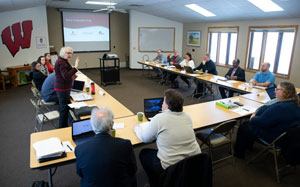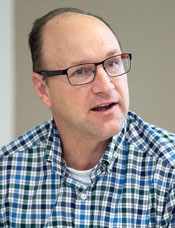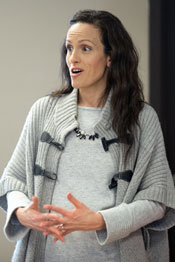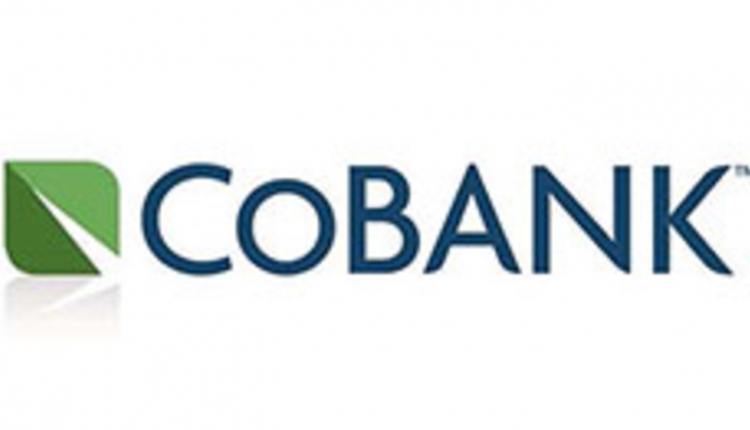
Members of the Dairy Innovation Hub advisory council held their first in-person meeting on Friday, Jan. 31 at the University of Wisconsin–Madison West Madison Agricultural Research Station. The five-hour meeting included introductions, presentations, brainstorming and discussion, meeting the hub’s new program manager, and electing a council chair.
The Dairy Innovation Hub, which the state is supporting to the tune of $1 million this year and $7.8 million per year in subsequent years, harnesses research and development at UW–Madison, UW–Platteville and UW¬–River Falls campuses to keep Wisconsin’s $45.6 billion dairy industry at the global forefront in producing nutritious dairy products in an economically, environmentally and socially sustainable manner.
The mission of the advisory council is to ensure that hub investments in university personnel, facilities, research and training will move the state’s industry forward in the four focus areas outlined in the original hub proposal: stewarding land and water resources, enriching human health and nutrition, ensuring animal health and welfare, and growing farm business and communities. In this role, the council will provide guidance to the hub’s leadership committee and its faculty director, a position currently held by UW–Madison dairy scientist Heather White.

At the meeting, the council elected Mitch Breunig of Mystic Valley Dairy to serve as chair. In this role, he will work with White and Maria Woldt, who was recently hired to serve as the hub’s program manager, to assemble the council and set agendas.
“The industry has faith in us to do the right thing with this investment,” said Breunig, “and that is why we are here.”
As program manager, Woldt will be handling budget matters, developing and disseminating communications, organizing and hosting events, and coordinating activities between hub collaborators at all three campuses. She assumes the role on Feb. 10.

The deans from the agricultural colleges at UW–Madison, UW–Platteville and UW¬–River Falls, who constitute the hub’s leadership committee, attended the meeting to thank advisory council members for their advocacy and support of the Dairy Innovation Hub initiative, and to provide updates on hub-related activities at each campus. All three colleges are gearing up to make their first hub-related investments, in coordination with each other.
During this first year of hub activity, Dale Gallenberg, dean of the College of Agriculture, Food and Environmental Studies at UW–River Falls, and Wayne Weber, dean of the College of Business, Industry, Life Sciences and Agriculture at UW–Platteville, say they plan to utilize hub funds to help address outdated facilities and equipment. At UW–River Falls, for instance, funds will be used for renovations in the dairy facility to help better facilitate research trials within the herd as well as updates to laboratories on campus. And at UW–Platteville, hub funding will be leveraged to replace inoperative robotic milking systems to foster opportunities for collaborative research and training across the hub.
Kate VandenBosch, dean of the College of Agricultural and Life Sciences at UW–Madison, announced that the college is making investments in postdoctoral research fellows and gearing up to launch a number of projects with short-term deliverables. The college is also planning for the first faculty hires that will have a long-term impact on research innovation. In addition, the three deans are exploring collaborative undergraduate research opportunities.
“I am excited about the potential for the three universities to work together,” said Aric Dieter from Landmark Cooperative, who represents the Dairy Business Association on the advisory council. “There is so much that can be done through these projects and collaborations, and we are just at the beginning of efforts to tap that potential.”
During the meeting, council members took time to share some of their ideas about the transformational innovations they would like to see the hub pursue. They discussed opportunities in finding synergies between human and animal health; creating programs to foster entrepreneurship; exploring solutions to environmental challenges; developing novel products to meet consumer demand for new foods; and to find ways to use dairy waste to create new products of value; among other ideas.
“I remember having lots of conversations that started around what we would do if we could, and now we are discussing what we will do because we can,” said Shelly Mayer, executive director of the Professional Dairy Producers of Wisconsin. “It is one of the proudest moments I have had — to see us all come together for this and for the three campuses to have this funding [to do this work].”
The advisory council plans to convene in-person on a quarterly basis. The next meeting is being planned for April.


